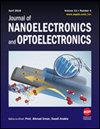A Kirchhoff Plate Model for Longitudinal Vibration Analysis of Restrained Nanoplate Including Thermal Effects
IF 0.6
4区 工程技术
Q4 ENGINEERING, ELECTRICAL & ELECTRONIC
引用次数: 0
Abstract
This work attempts to apply the Kirchhoff plate theory to find out the vibrational analyses of a nanoplate incorporating thermal effects. The effects of thermal environments on the natural frequency of longitudinal vibration of restrained nanomaterials, especially for restrained nanoplates, have not been investigated, and most of the previous research has been carried out for unrestrained nanoplates. Therefore, it must be emphasized that the vibrations of restrained nanoplate, including thermal effects, are novel and applicable to the nanodevices, in which nanoplates act as the main structure of the nanocomposite. A novel motion and frequency equation are derived using the Kirchhoff plate model. The present study illustrates that a nanoplate’s longitudinal vibration characteristics strongly depend on the temperature change and stiffness coefficients. The numerical results clearly show that the longitudinal natural frequencies of the nanoplate are less than unity for both cases of low and high temperatures. This means that applying the Kirchhoff plate model for restrained nanoplate analysis would lead to an over-prediction of the frequency if the small thermal stress effect is neglected. Finally, the investigation of the restrained and thermal impact on longitudinal vibration of nanoplates may be used as a valuable reference for the application and the design of nanoelectronics and nano-drives devices, nano-oscillators, and nano-sensors, in which nanoplates act as essential elements.包括热效应在内的克氏板纵向振动分析模型
本研究试图应用基尔霍夫板理论,对包含热效应的纳米板进行振动分析。热环境对受约束纳米材料(尤其是受约束纳米板)纵向振动固有频率的影响尚未得到研究,以往的研究大多针对非受约束纳米板。因此,必须强调的是,受约束纳米板的振动(包括热效应)是新颖的,适用于以纳米板作为纳米复合材料主要结构的纳米器件。利用基尔霍夫板模型推导出了新的运动和频率方程。本研究表明,纳米板的纵向振动特性与温度变化和刚度系数密切相关。数值结果清楚地表明,在低温和高温两种情况下,纳米板的纵向固有频率都小于 1。这意味着,如果忽略微小的热应力效应,采用基尔霍夫板模型进行约束纳米板分析会导致频率预测过高。最后,对纳米板纵向振动的约束和热影响的研究可以为纳米电子和纳米驱动设备、纳米振荡器和纳米传感器的应用和设计提供有价值的参考。
本文章由计算机程序翻译,如有差异,请以英文原文为准。
求助全文
约1分钟内获得全文
求助全文
来源期刊

Journal of Nanoelectronics and Optoelectronics
工程技术-工程:电子与电气
自引率
16.70%
发文量
48
审稿时长
12.5 months
 求助内容:
求助内容: 应助结果提醒方式:
应助结果提醒方式:


